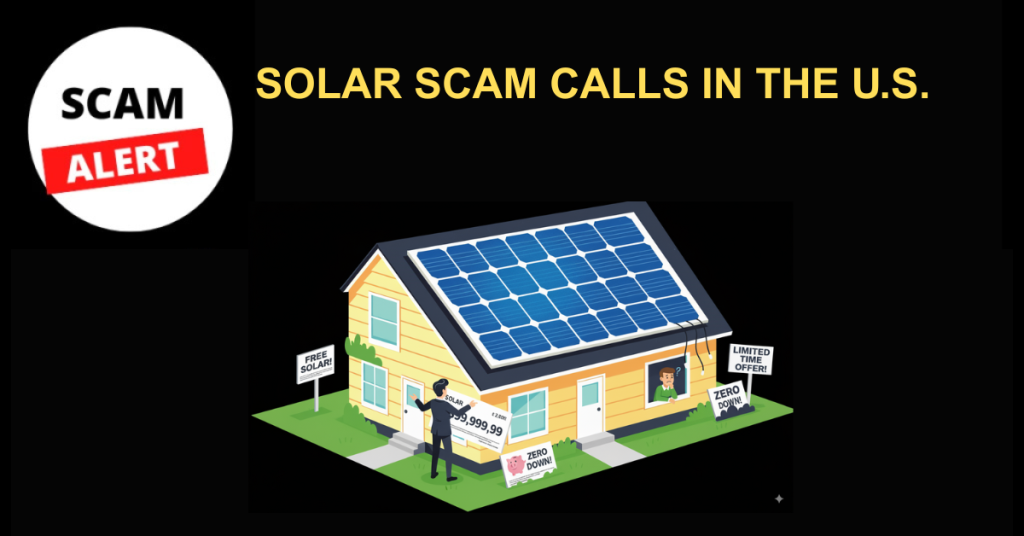As solar energy becomes more popular, so do scams targeting homeowners. Fraudulent callers often impersonate government agencies or utility companies, offering “free” solar panel installations or claiming that your electricity bills will be eliminated through government programs. These offers are typically too good to be true and are designed to exploit unsuspecting consumers.
The Solar Scam Epidemic
As solar energy gains popularity across the U.S., scammers have found the perfect prey: homeowners eager to save money and go green. These con artists rely on two things: trust and urgency. They impersonate utility companies, government agencies, or well-known solar brands, creating a sense of legitimacy that’s hard to question. They promise free installations, inflated rebates, or dramatic reductions in electricity bills—all too good to be true.
In 2023 alone, reports of solar scam calls surged, especially in states like Texas, Florida, and Arizona. Some victims, especially seniors, ended up losing tens of thousands of dollars to these high-pressure pitches. One Texas resident, misled by a so-called “free solar” offer, found herself stuck with a $56,000 loan for panels that were never installed.
According to the Federal Trade Commission (FTC), Americans lost billions to scam calls in 2023, with energy-related scams ranking among the most common. Y
How These Scams Work
Scammers are experts in manipulation:
- Impersonation: They claim to be your power company or a government program. Sometimes they even spoof official phone numbers.
- False Promises: They offer “free” panels, zero electricity bills, or massive rebates. These offers are designed to sound irresistible—but they’re completely false.
- High-Pressure Tactics: Scammers rush victims to sign contracts immediately, often using tablets or e-signatures so there’s no time to read the fine print.
In some cases, these calls are automated robocalls, flooding millions of Americans’ phones with persuasive messages. Despite stricter federal rules, scammers are constantly evolving, using AI-generated voices and spoofed numbers to trick even the most cautious homeowners.
Real Stories, Real Losses
Consider the story of a Florida retiree, excited to lower her energy bills. A caller claiming to represent a solar company told her she qualified for a government rebate. Within days, she had signed a contract and wired thousands of dollars—only to discover the company didn’t exist.
These stories aren’t rare. Across the U.S., seniors and homeowners unfamiliar with solar programs are prime targets. In Texas, complaints about solar scams increased over 800% between 2018 and 2023. These scams don’t just take money—they erode trust, leaving victims feeling vulnerable and embarrassed.
How to Protect Yourself
The good news? Awareness is the most powerful weapon. Here’s how you can protect yourself:
- Always Verify: If a caller claims to represent your utility or a government program, hang up and call the official number yourself.
- Question “Free” Offers: No legitimate program will install solar panels at zero cost.
- Don’t Give Out Personal Info: Never share financial details with an unsolicited caller.
- Use Tools Like RealCall: Call-blocking apps can detect spoofed numbers and stop robocalls before they reach you.
- Report Suspicious Calls: File complaints with the FTC at donotcall.gov.
Stay Smart, Stay Safe
Solar energy is a smart, sustainable choice—but scammers are trying to turn your smart decision into a costly mistake. Don’t let them. Protect your money, your peace of mind, and your home. With awareness, verification, and tools like RealCall, you can enjoy the benefits of solar without falling victim to fraud.
Introducing RealCall – Stop Spam Calls Effortlessly
Tired of robocalls, telemarketers, and scam calls? RealCall uses advanced AI to identify and block 99% of spam, scam, and unknown calls before they reach you. With over 3 million spammers blocked, it ensures your phone stays interruption-free.
Key Features:
- Automatic Spam Blocking: Stops known spam numbers before your phone rings.
- Spam & Scam Message Filtering: Separates unwanted texts from legitimate ones.
- Caller Alerts: Instantly flags suspicious calls as “Scam Likely” or “Spam Risk.”
- Daily Updates: Keeps your spam database current.
- Custom Blocklist/Whitelist: Manage numbers your way.
Why RealCall?
- Stops robocalls and scams in their tracks.
- Identifies callers so you never miss important calls.
- Simple, intuitive interface with full privacy protection.
- Works 24/7 with all carriers for round-the-clock spam protection.
Take control of your phone and enjoy peace of mind with RealCall.

